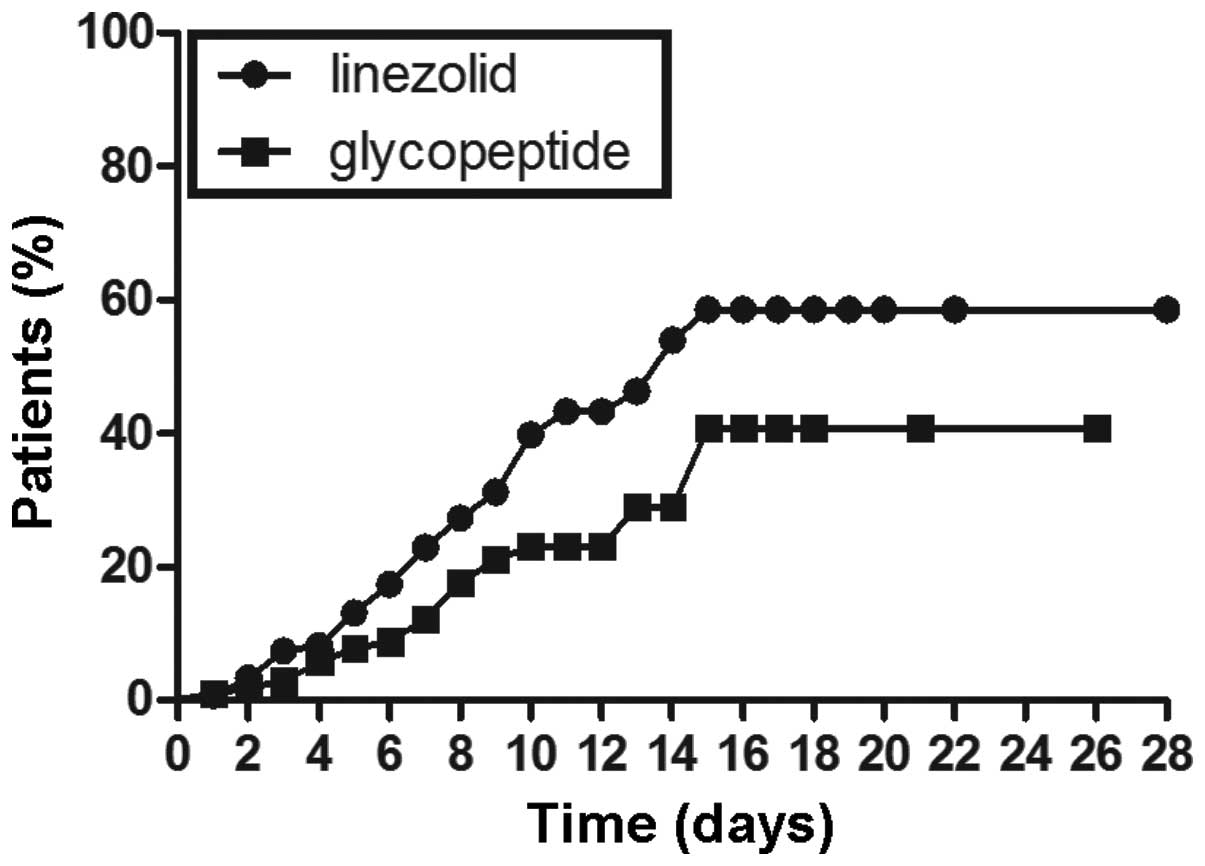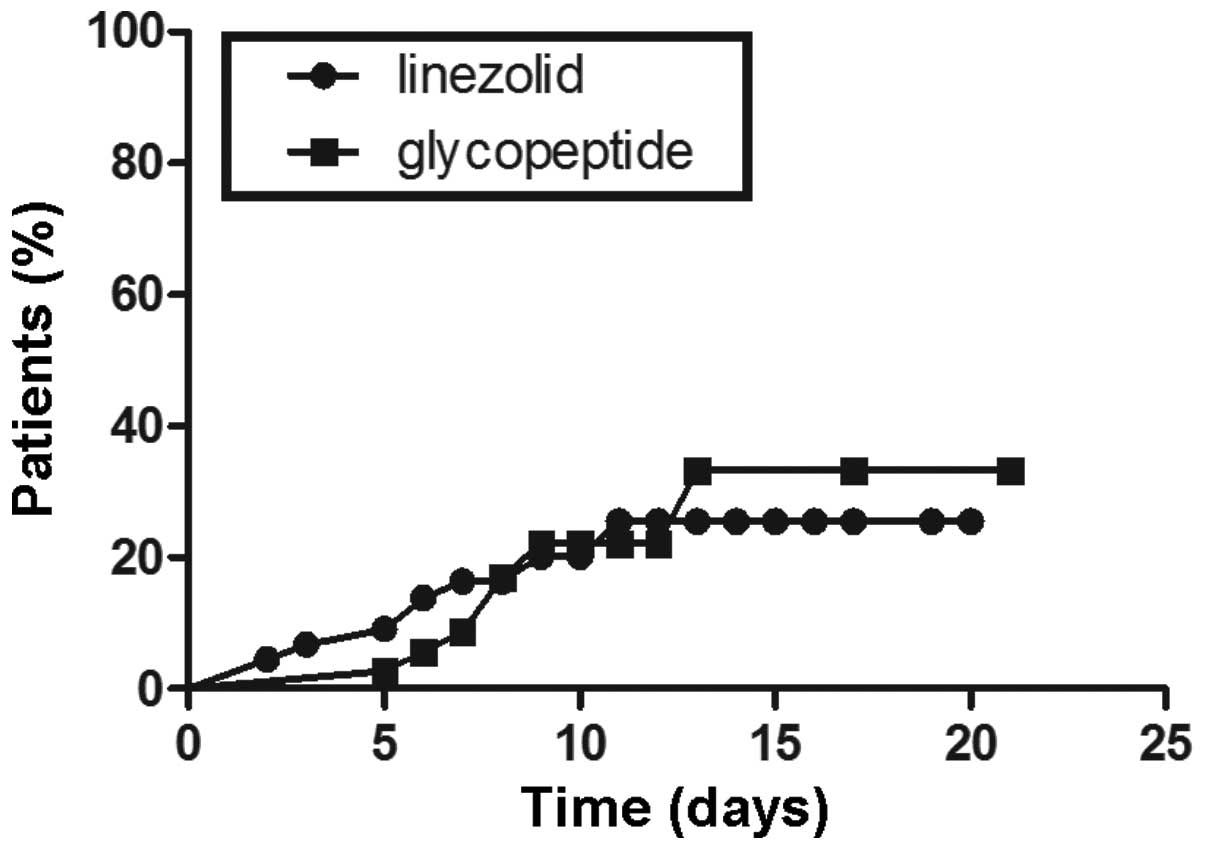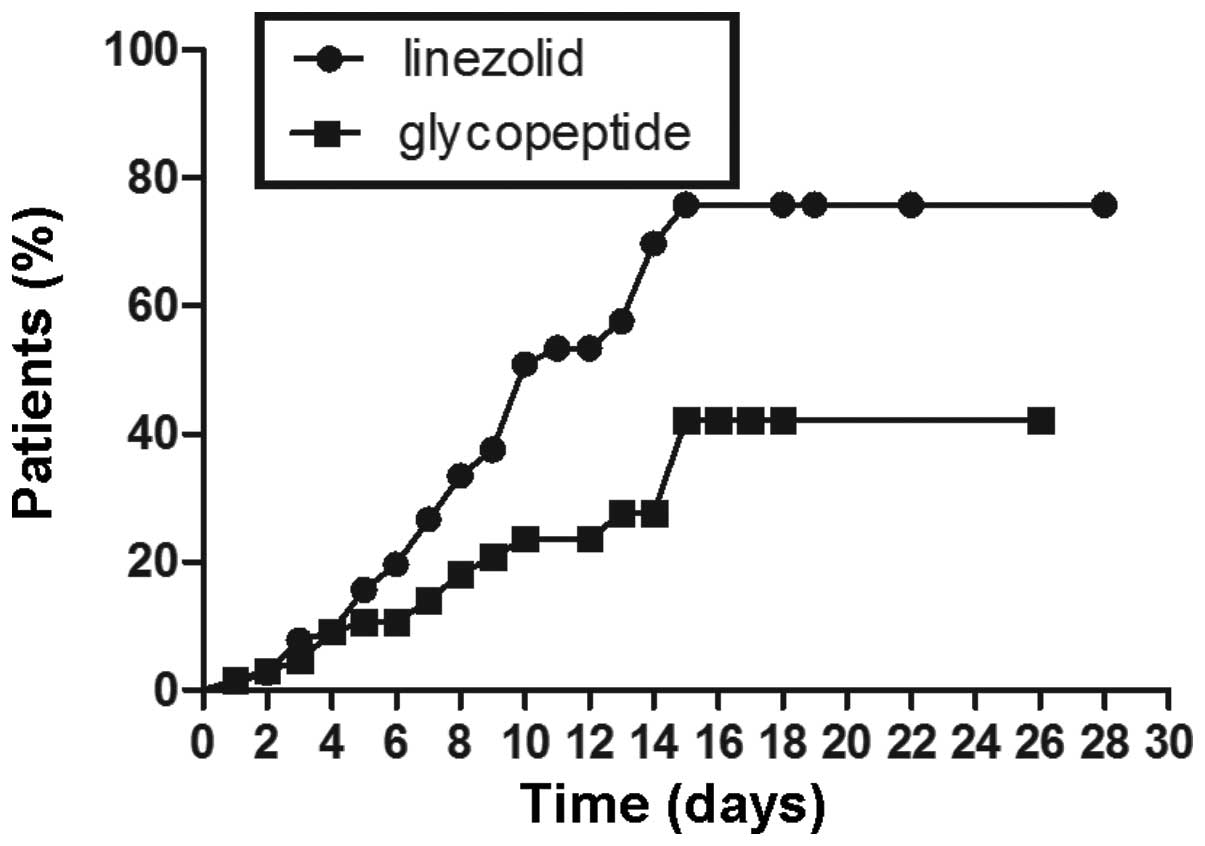|
1
|
Liu YN, Cao B, Wang H, et al: Adult
hospital acquired pneumonia: a multicenter study on microbiology
and clinical characteristics of patients from 9 Chinese cities.
Zhonghua Jie He He Hu Xi Za Zhi. 35:739–746. 2012.(In Chinese).
|
|
2
|
Diekema DJ, Pfaller MA, Schmitz FJ, et al;
SENTRY Partcipants Group. Survey of infections due to
Staphylococcus species: frequency of occurrence and
antimicrobial susceptibility of isolates collected in the United
States, Canada, Latin America, Europe, and the Western Pacific
region for the SENTRY Antimicrobial Surveillance Program,
1997–1999. Clin Infect Dis. 32(Suppl 2): S114–S132. 2001.PubMed/NCBI
|
|
3
|
Kim HB, Park WB, Lee KD, et al: Nationwide
surveillance for Staphylococcus aureus with reduced
susceptibility to vancomycin in Korea. J Clin Microbiol.
41:2279–2281. 2003.
|
|
4
|
Riska EB, Böstman O, von Bonsdorff H, et
al: Outcome of closed injuries exceeding 20-unit blood transfusion
need. Injury. 19:273–276. 1988. View Article : Google Scholar : PubMed/NCBI
|
|
5
|
Stéphan F, Hollande J, Richard O, Cheffi
A, Maier-Redelsperger M and Flahault A: Thrombocytopenia in a
surgical ICU. Chest. 115:1363–1370. 1999.
|
|
6
|
Baughman RP, Lower EE, Flessa HC and
Tollerud DJ: Thrombocytopenia in the intensive care unit. Chest.
104:1243–1247. 1993. View Article : Google Scholar : PubMed/NCBI
|
|
7
|
Shalansky SJ, Verma AK, Levine M, Spinelli
JJ and Dodek PM: Risk markers for thrombocytopenia in critically
ill patients: a prospective analysis. Pharmacotherapy. 22:803–813.
2002. View Article : Google Scholar : PubMed/NCBI
|
|
8
|
Strauss R, Wehler M, Mehler K, Kreutzer D,
Koebnick C and Hahn EG: Thrombocytopenia in patients in the medical
intensive care unit: bleeding prevalence, transfusion requirements,
and outcome. Crit Care Med. 30:1765–1771. 2002. View Article : Google Scholar : PubMed/NCBI
|
|
9
|
Vanderschueren S, De Weerdt A, Malbrain M,
et al: Thrombocytopenia and prognosis in intensive care. Crit Care
Med. 28:1871–1876. 2000. View Article : Google Scholar : PubMed/NCBI
|
|
10
|
Cawley MJ, Wittbrodt ET, Boyce EG and
Skaar DJ: Potential risk factors associated with thrombocytopenia
in a surgical intensive care unit. Pharmacotherapy. 19:108–113.
1999. View Article : Google Scholar : PubMed/NCBI
|
|
11
|
Akca S, Haji-Michael P, de Mendonça A,
Suter P, Levi M and Vincent JL: Time course of platelet counts in
critically ill patients. Crit Care Med. 30:753–756. 2002.
View Article : Google Scholar : PubMed/NCBI
|
|
12
|
Wang HL, Aguilera C, Knopf KB, Chen TM,
Maslove DM and Kuschner WG: Thrombocytopenia in the Intensive Care
Unit. J Intensive Care Med. 28:268–280. 2013. View Article : Google Scholar : PubMed/NCBI
|
|
13
|
Patnode NM and Gandhi PJ: Drug-induced
thrombocytopenia in the coronary care unit. J Thromb Thrombolysis.
10:155–167. 2000. View Article : Google Scholar : PubMed/NCBI
|
|
14
|
Soriano A, Ortega M, García S, et al:
Comparative study of the effects of pyridoxine, rifampin, and renal
function on hematological adverse events induced by linezolid.
Antimicrob Agents Chemother. 51:2559–2563. 2007. View Article : Google Scholar : PubMed/NCBI
|
|
15
|
Gerson SL, Kaplan SL, Bruss JB, et al:
Hematologic effects of linezolid: summary of clinical experience.
Antimicrob Agents Chemother. 46:2723–2726. 2002. View Article : Google Scholar : PubMed/NCBI
|
|
16
|
Kohno S, Yamaguchi K, Aikawa N, et al:
Linezolid versus vancomycin for the treatment of infections caused
by methicillin-resistant Staphylococcus aureus in Japan. J
Antimicrob Chemother. 60:1361–1369. 2007. View Article : Google Scholar : PubMed/NCBI
|
|
17
|
Stevens DL, Herr D, Lampiris H, Hunt JL,
Batts DH and Hafkin B: Linezolid versus vancomycin for the
treatment of methicillin-resistant Staphylococcus aureus
infections. Clin Infect Dis. 34:1481–1490. 2002. View Article : Google Scholar : PubMed/NCBI
|
|
18
|
Rubinstein E, Isturiz R, Standiford HC, et
al: Worldwide assessment of linezolid’s clinical safety and
tolerability: comparator-controlled phase III studies. Antimicrob
Agents Chemother. 47:1824–1831. 2003.
|
|
19
|
Nasraway SA, Shorr AF, Kuter DJ, O’Grady
N, Le VH and Cammarata SK: Linezolid does not increase the risk of
thrombocytopenia in patients with nosocomial pneumonia: comparative
analysis of linezolid and vancomycin use. Clin Infect Dis.
37:1609–1616. 2003. View
Article : Google Scholar : PubMed/NCBI
|
|
20
|
Xu HB, Jiang RH, Li L and Xiao HP:
Linezolid in the treatment of MDR-TB: a retrospective clinical
study. Int J Tuberc Lung Dis. 16:358–363. 2012. View Article : Google Scholar : PubMed/NCBI
|
|
21
|
Attassi K, Hershberger E, Alam R and
Zervos MJ: Thrombocytopenia associated with linezolid therapy. Clin
Infect Dis. 34:695–698. 2002. View
Article : Google Scholar : PubMed/NCBI
|
|
22
|
Niwa T, Suzuki A, Sakakibara S, et al:
Retrospective cohort chart review study of factors associated with
the development of thrombocytopenia in adult Japanese patients who
received intravenous linezolid therapy. Clin Ther. 31:2126–2133.
2009. View Article : Google Scholar
|
|
23
|
Takahashi Y, Takesue Y, Nakajima K, et al:
Risk factors associated with the development of thrombocytopenia in
patients who received linezolid therapy. J Infect Chemother.
17:382–387. 2011. View Article : Google Scholar : PubMed/NCBI
|
|
24
|
Le Moyec L, Racine S, Le Toumelin P, et
al: Aminoglycoside and glycopeptide renal toxicity in intensive
care patients studied by proton magnetic resonance spectroscopy of
urine. Crit Care Med. 30:1242–1245. 2002.PubMed/NCBI
|
|
25
|
Xie L, He S, Fu L, et al: The prevalence
and risk factors of thrombocytopenia after living-related renal
transplantation in Chinese adult recipients. Transplant Proc.
45:197–199. 2013. View Article : Google Scholar : PubMed/NCBI
|
|
26
|
Falagas ME, Siempos II and Vardakas KZ:
Linezolid versus glycopeptide or beta-lactam for treatment of
Gram-positive bacterial infections: meta-analysis of randomised
controlled trials. Lancet Infect Dis. 8:53–66. 2008. View Article : Google Scholar : PubMed/NCBI
|
|
27
|
Kalil AC, Murthy MH, Hermsen ED, Neto FK,
Sun J and Rupp ME: Linezolid versus vancomycin or teicoplanin for
nosocomial pneumonia: a systematic review and meta-analysis. Crit
Care Med. 38:1802–1808. 2010. View Article : Google Scholar : PubMed/NCBI
|
|
28
|
Patel N, VanDeWall H, Tristani L, et al: A
comparative evaluation of adverse platelet outcomes among Veterans’
Affairs patients receiving linezolid or vancomycin. J Antimicrob
Chemother. 67:727–735. 2012.PubMed/NCBI
|
|
29
|
An MM, Shen H, Zhang JD, Xu GT and Jiang
YY: Linezolid versus vancomycin for meticillin-resistant
Staphylococcus aureus infection: a meta-analysis of
randomised controlled trials. Int J Antimicrob Agents. 41:426–433.
2013. View Article : Google Scholar : PubMed/NCBI
|
|
30
|
Hiraki Y, Tsuji Y, Hiraike M, et al:
Correlation between serum linezolid concentration and the
development of thrombocytopenia. Scand J Infect Dis. 44:60–64.
2012. View Article : Google Scholar : PubMed/NCBI
|
|
31
|
Orrick JJ, Johns T, Janelle J and Ramphal
R: Thrombocytopenia secondary to linezolid administration: what is
the risk? Clin Infect Dis. 35:348–349. 2002. View Article : Google Scholar : PubMed/NCBI
|
|
32
|
Chen C, Guo D, Cao X, et al: Risk factors
for thrombocytopenia in adult chinese patients receiving linezolid
therapy. Curr Ther Res Clin Exp. 73:195–206. 2012. View Article : Google Scholar : PubMed/NCBI
|

















